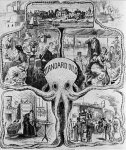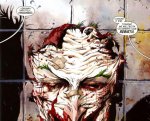Now it turns out that this light bulb over the colonel’s head here is the same identical Osram light bulb that Franz Pokler used to sleep next to in his bunk at the underground rocket works at Nordhausen. Statistically (so Their story goes), every n-thousandth bulb is gonna be perfect, all the delta-q’s piling up just right, so we shouldn’t be surprised that his one’s still around, burning brightly. But the truth is even more stupendous. This bulb is immortal! It’s been around, in fact, since the twenties, has that old-timery point at the tip and is less pear-shaped than more contemporary bulbs. Wotta history, this bulb, if only it could speak—well, as a matter of fact, it can speak. It is dictating the muscular modulations of Paddy McGonigle’s cranking tonight, this is a loop here, with feedback through Paddy to the generator again. Here it is,
THE STORY OF BYRON THE BULB
When M-Day finally does roll around, you can bet Byron’s elated. He has passed the time hatching some really insane grandiose plans—he’s gonna organize all the Bulbs, see, get him a power base in Berlin, he’s already hep to the Strobing Tactic, all you do is develop the knack (Yogic, almost) of shutting off and on at a rate close to the human brain’s alpha rhythm, and you can actually trigger an epileptic fit! True, Byron has had a vision against the rafters of his ward, of 20 million Bulbs, all over Europe, at a given synchronizing pulse arranged by one of his many agents in the Grid, all these Bulbs beginning to strobe together, humans thrashing around the 20 million rooms like fish on the beaches of Perfect Energy—Attention, humans, this has been a warning to you. Next time, a few of us will explode. Ha-ha. Yes we’ll unleash our Kamikaze squads! You’ve heard of the Kirghiz Light? well that’s the ass end of a firefly compared to what we’re gonna—oh, you haven’t heard of the—oh, well, too bad. Cause a few Bulbs, say a million, a mere 5% of our number, are more than willing to flame out in one grand burst instead of patiently waiting out their design hours….So Byron dreams of his Guerrilla Strike Force, gonna get Herbert Hoover, Stanley Baldwin, all of them, right in the face with one coordinated blast…
At 800 hours—another routine precaution—a Berlin agent is sent out to the opium den to transfer Byron. She is wearing asbestos-lined kid gloves and seven-inch spike heels, no not so she can fit in with the crowd, but so that she can reach that sconce to unscrew Byron. The other bulbs watch, in barely subdued terror. The word goes out along the Grid. At something close to the speed of light, every bulb, Azos looking down the empty black Bakelite streets, Nitralampen and Wotan Gs at night soccer matches, Just-Wolframs, Monowatts and Siriuses, every bulb in Europe knows what’s happened. They are silent with impotence, with surrender in the face of struggles they thought were all myth. We can’t help, this common thought humming through pastures of sleeping sheep, down Autobahns and to the bitter ends of coaling piers in the North, there’s never been anything we could do…Anyone shows us the meanest hope of transcending and the Committee on Incandescent Anomalies comes in and takes him away. Some do protest, maybe, here and there, but it’s only information, glow-modulated harmless, nothing close to the explosions in the faces of the powerful that Byron once envisioned, back there in his Baby ward, in his innocence...
Through his years of survival, all these various rescues of Byron happen as if by accident. Whenever he can, he tries to instruct any bulbs nearby in the evil nature of Phoebus, and in the need of solidarity against the cartel. He has come to see how Bulb must move beyond its role as conveyor of light-energy alone. Phoebus has restricted Bulb to this one identity. “But there are other frequencies, above and below the visible band. Bulb can give heat. Bulb can provide energy for plants to grow, illegal plants, inside closets, for example. Bulb can penetrate the sleeping eye, and operate among the dreams of men.” Some bulbs listened attentively—others thought of ways to fink to Phoebus. Some of the older anti-Byronists were able to fool with their parameters in systematic ways that would show up on the ebonite meters under the Swiss mountain: there were even a few self-immolations, hoping to draw the hit men down...
Byron, as he burns on, sees more and more of this pattern. He learns how to make contact with other kinds of electric appliances, in homes, in factories and out in the streets. Each has something to tell him. The pattern gathers in his soul (Seele, as the core of the earlier carbon filament was known in Germany), and the grander and clearer it grows, the more desperate Byron gets. Someday he will know everything, and still be as impotent as before. His youthful dreams of organizing all the bulbs in the world seem impossible now—the Grid is wide open, all messages can be overheard, and there are more than enough traitors out in the line. Prophets traditionally don’t last long—they are either killed outright, or given an accident serious enough to make them stop and think, and most often they do pull back. But on Byron has been visited an even better fate. He is condemned to go on forever, knowing the truth and powerless to change anything. No longer will he seek to get off the wheel. His anger and frustration will grow without limit, and he will find himself, poor perverse bulb, enjoying it…



